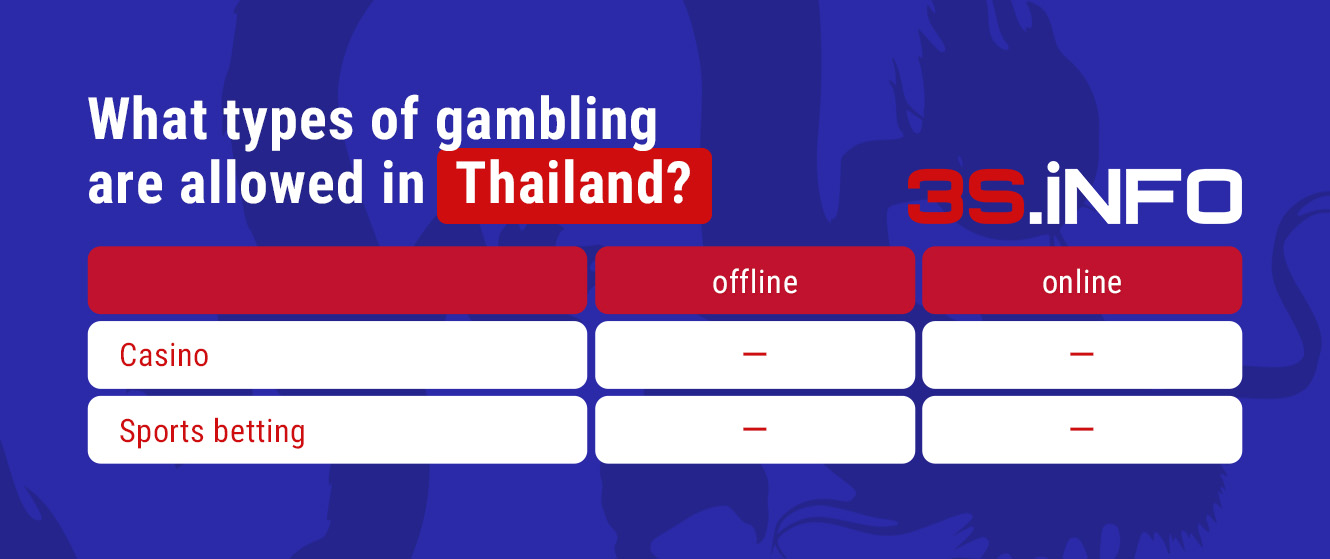
Publication date: 27 Feb 2025
In Thailand, nearly all forms of gambling and betting are subject to strict legal controls. While online casinos and online sports betting are officially prohibited, many Thais and tourists continue to access international platforms. Recently, there have been active discussions about the potential legalization of casinos as a means to attract tourists and boost revenue. In our latest mini-review on 3S.INFO, we’ll explore strategies for promoting online gambling in Thailand and examine the future outlook for this industry.
How is gambling regulated in Thailand?
Thailand’s gambling laws date back to 1935 when the “Gambling Act B.E.2478” was enacted, outlawing virtually all forms of betting and gambling. This blanket ban encompasses bookmaking operations, betting on all sports, sweepstakes. Traditional casino games such as poker, roulette, and bingo are illegal, along with popular pastimes like mahjong, dominoes, backgammon, and even billiards.
In 1943, an additional measure—the “Playing Cards Act”—was introduced, restricting individuals from possessing more than 120 playing cards without registering them with the Excise Department of the Ministry of Finance. Even casual card games among friends at home are forbidden. Authorities are empowered to conduct searches of private properties during daylight hours under this legislation. Furthermore, the production of playing cards remains tightly controlled by the government through its state-run Playing Card Factory.
A subsequent amendment in 2007 specifically targeted online casinos and betting shops, further tightening restrictions on internet-based gambling activities. Since 2020, oversight and enforcement of these regulations have fallen under the purview of the Ministry of Digital Economy and Society, which is tasked with monitoring and blocking non-compliant websites.
What types of gambling are allowed in Thailand?

What are the penalties for gambling in Thailand?
Engaging in online gambling or betting via unauthorized platforms may result in fines of up to 5,000 baht (approximately US$150) or imprisonment.
Those organizing online gambling face steeper penalties, including fines of up to 100,000 baht (around US$3,000) and sentences of up to three years behind bars.
Foreign nationals or tourists found violating gambling laws risk deportation and being barred from reentering Thailand in the future.
How are illegal casino and bookmaking websites blocked in Thailand?
The Ministry of Digital Economy and Society oversees the blocking of illegal casino and bookmaker websites.
Additionally, the Royal Thai Police plays a key role in combating both online and offline gambling within the kingdom.
During the European Football Championship—culminating on July 17, 2024—a concerted effort yielded over 2,600 arrests. To tackle illicit betting related to Euro 2024, authorities established a dedicated center aimed at preventing and suppressing illegal football wagering. By the end of the tournament, 784 individuals were apprehended on-site, encompassing three bookmakers, twelve bet collectors, and 769 gamblers. Moreover, officials shuttered 80 sports betting websites and took into custody 265 suspects, comprising 35 gambling operators and 230 players.
Outlook for the gambling industry in Thailand
In the summer of 2024, the Thai government announced plans to potentially legalize casinos, proposing their establishment in popular resort areas such as Bangkok, Pattaya, Chiang Mai, and Phuket (totaling five land-based casinos).
In addition, experts say that the launch of the land-based sector would make Thailand the third largest gambling market in the world (after Macau and Las Vegas) with a GGR of $4 to $6 billion per year (Morgan Stanley estimate). Meanwhile, a legal and developed gambling industry could generate as much as $31 billion per year, according to a study by CSLA Ltd.
On February 18, 2025, amendments to the bill restricted casino access exclusively to Thai residents holding over 500 million baht (roughly $15 million) in assets.
Toward the end of 2024, the Thai government drafted legislation permitting online gambling nationwide. “Online gambling poses challenges to society and the economy. Thus, the optimal approach involves eradicating underground gambling by legalizing it, thereby generating legitimate revenue while stimulating economic growth,” remarked Deputy Prime Minister Prasert Jantararuangtong.
Leading operators, including Galaxy Entertainment, Caesars Entertainment, and Wynn Resorts, promptly expressed interest in venturing into Thailand’s burgeoning gambling and betting markets.
How do casino and bookmaker websites attract the Thai audience?
Located in Southeast Asia, the Kingdom of Thailand operates under a constitutional monarchy.
Its population exceeds 66 million, with approximately 5.5 million residents inhabiting Bangkok, the nation’s capital. Major urban centers, defined as settlements exceeding 50,000 inhabitants, include Ayutthaya, Khon Kaen, Lampang, Nakhon Ratchasima (Korat), Nakhon Sawan, Nakhon Si Thammarat, Nonthaburi, Pakkret, Phitsanulok, Phuket, and Surat Thani.
The official language is Thai.
The official currency is the Thai Baht.
Buddhism is the main religion, practiced by more than 90% of the population.
Which sports are popular in Thailand?
The “local” sports in Thailand garner significant attention from visitors frequenting online bookmakers:
- Thai Boxing or Muay Thai (“Free Fight”) has been deeply ingrained in Thai culture since the 16th century. The sport enjoys immense popularity, evidenced by the celebration of “Thai Boxing Day” on February 6 (previously observed on March 17 until 2012). Despite falling on a weekday, festivities, competitions, and ceremonial events take place across the nation.
- Horse racing represents the sole legal avenue for sports betting in Thailand. Two prominent racetracks in Bangkok, the Royal Bangkok Sports Club (RBSC) and the Royal Turf Club (RTC), regulate this activity.
- With a history spanning seven centuries, cockfighting in Thailand stands apart for its relatively humane practices: contestants are not pitted against each other to the death, nor are lethal weapons employed. Though wagering on outcomes remains illegal, the sport persists due to extensive networks of specialized stadiums catering to audiences nationwide.
- Bullfights (Corrida) pit two buffaloes against one another, yet neither animal suffers fatal injuries. Victory is determined when one buffalo flees or collapses. These battles unfold in designated arenas, predominantly situated in southern regions and on the island of Samui.
- Traditionally held in September following the rainy season, boat races captivate spectators across various provinces, including Pathum Thani, Nakhon Phanom, and Surat Thani. Long wooden boats, manned by rowers seated in double file, dominate the waterways. Adjacent to the venues, vibrant fairs and festivals spring up, offering fruits and souvenirs for purchase.
What casino games are popular with Thais?
- Thai roulette is a large canvas (not a circle as in classic roulette) on which you can place bets on multiple numbers from 0 to 9. A ball determines the winning digit, and payouts vary depending on the number of successful bets placed. Winnings multiply tenfold for singular correct predictions, triple for those hitting one of three, and double for correctly guessing one of four.
- Tai sai is a game in which bets are placed in a box with special markings on the combinations of three dice.
- Pok daeng and Sip them are Thai games similar to poker, where players are dealt different numbers of cards.
- Fun tan is a game in which bets are placed on the number of “beads” (or pebbles) that will remain in the last slide after the croupier randomly pours out an indeterminate number of “beads” in a box with special markings.
Which traffic sources are popular in Thailand?
Based on data from StatCounter for the period between January 2024 and January 2025, the most frequented platforms among Thai residents are:
- Social media: Twitter (76.04%), Facebook* (13.57%), YouTube (4.92%), Pinterest (2.17%), Instagram* (2.08%), LinkedIn (0.57%).
- Search engines: Google (92.01%), Bing (5.02%), Yahoo! (2.72%), Yandex (0.09%), DuckDuckGo (0.08%), Baidu (0.03%).
- Mobile has 553.95% of the market, desktop has 39.91%.
- The most popular models of mobile devices: Apple (31.09%), Samsung (21.9%), Oppo (13.91%), Vivo (10.61%), Xiaomi (7.5%), Realme (4.64%).
- The most popular browsers are Chrome (70.06%), Safari (18.38%), Edge (4.22%), Samsung Internet (2.94%), Firefox (2.92%) and Opera (0.72%).
(Facebook and Instagram are blocked in Russia by court order).
In Thailand, stringent laws govern betting (sports betting) and gambling (casino games), rendering most forms of gambling strictly prohibited. Nonetheless, come spring 2025, Thailand will witness a pivotal change: a law enabling the operation of land-based casinos is slated to pass. This milestone might herald the beginning of broader legalization efforts encompassing all forms of gambling, including online platforms. In anticipation of this transformation, now is the ideal time to explore the latest, high-converting 3SNET offerings tailored for bookmakers and casinos targeting Thai audiences.
Share it with your friends via favorite social media

























